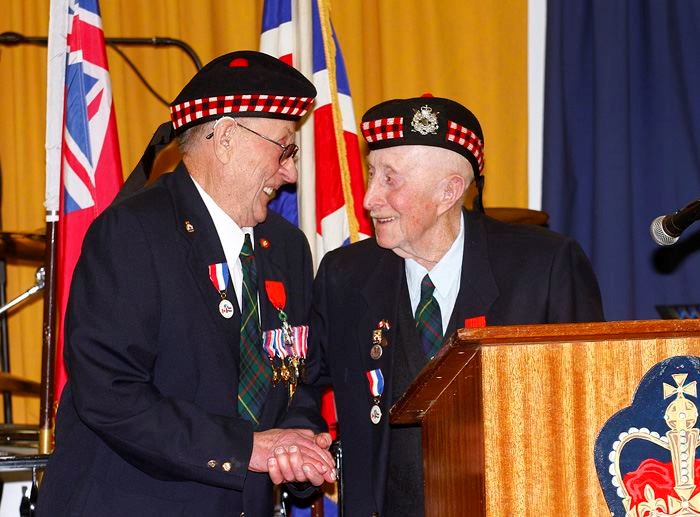On June 6, 1944 longtime Prince George resident Armand Denicola landed on Juno Beach, near the town of Courseulles-sur-Mer, with his fellow soldiers from the Canadian Scottish Regiment.
A month later, on July 7, John Kuharchuk arrived on Juno Beach and marched inland to reinforce the Canadian Scottish as they fought in the Battle of Caen to take control of the strategic French city.
On Saturday both men were made chevaliers (knights) of the French Legion d'Honneur in a ceremony at the Royal Canadian Legion for their roles in the Battle of Normandy. MLA Shirley Bond presented Denicola and Kuharchuk with Legion d'Honneur medals on behalf of French President Francois Hollande -two of 436 Canadian D-Day veterans honoured by France this year to mark the 70th anniversary of battle. In addition, the men were presented plaques from Prime Minister Stephen Harper and Premier Christy Clark recognizing their service.
"I'm very proud," Denicola said. "[But] it belongs to all the boys who died on D-Day and after. It wasn't just D-Day, it was the whole Battle of Normandy."
On D-Day alone, Canada suffered 359 soldiers killed, 574 wounded and 47 taken prisoner.
By the end of the Battle of Normandy, 5,500 Canadians had been killed in battle and many thousands more injured.
All Denicola would say about his experience on D-Day is that, "... I'll never go to hell, because I've already been there."
One company of the Canadian Scottish landed on the far right flank of the initial assault, and stormed across 75 to 100 metres of beach under machine gun and mortar fire. The remaining three companies landed about an hour later as reserves, and took an hour to clear the beach because of heavy mortar fire.
In a 2004 interview, Denicola told the Citizen "a lot of our soldiers drowned before they ever hit the beach, but some of us got there, and we were the only ones that got near our objective that same day."
By the end of D-Day, the Canadian Scottish had fought their way more than nine kilometres inland and were dug in around the village of Pierrepont. The regiment suffered 87 casualties, both killed and wounded, on D-Day.
"D-Day never ended. We just kept moving forward or backward. We slept when we fell asleep. Our unit went 54 days without a change of clothes or a shower. It was all bad. I can't pick out one thing and say that it was the worst," Denicola said. "D-Day was only one day of a long summer. Something I like to leave behind me."
Ten days after D-Day, he was wounded with shrapnel in his leg and hand.
"Our first-aid post had been blown up, so I ended up in a church basement where a group of nuns cared for the wounded. I called them Angels of Mercy," he said.
Denicola recovered, and never faced heavy fighting again during the war. By April 1945 he was back with his own unit escorting 15,000 German prisoners back to Germany.
Now in his 90s, he joined the army in 1943 and served to the end of the war.
Denicola's stepson Drew Larsen said his father rarely talks about his experiences in the war.
"He's always concentrated, his whole life, on family and friends and running his farm," Larsen said. "He's lived in Prince George since his father brought him from Italy as a three or four year old."
Denicola still lives on the family farm homesteaded by his father, Larsen said -although Larsen's brother now runs the farm.
HUMBLING HONOUR
"I accept the honour humbly," an emotion Kuharchuk said, after being presented the Legion d'Honnuer.
Kuharchuk was a 19-year-old Alberta farm boy when he joined the army. Today he is a 90-year-old veteran of 10 months of bloody fighting in Europe.
In an interview with the Citizen on Remembrance Day he said the war completely changed his life. He arrived in England in March 1944. Five months later he was fighting a bloody battle against the German Army.
"We waited 'till the tide went out and then we walked to shore" to July 7, 1944, he said.
They marched toward the sound of the battle raging around the bombed and battered city of Caen.
"It was under rubble," Kuharchuk said.
He fought on the front lines until the end of the war, "dodging bullets and digging slit trenches and shooting at the enemy."
"Your stomach tightens up and you just go on and do your thing," Kuharchuk said.
"You kind of lose your fear of what's going on around you. You fight the battle and you want to win the best way you know how. People dropping dead or wounded. You can't help them. They're hurting and you can't help them so that kind of goes through your mind."
Kuharchuk escaped without serious physical injury, but lost hearing in both his ears when a grenade was thrown into a house where he was manning a machine gun.
"I was lucky," he said.
Royal Canadian Legion Branch Branch 43 president Bruce Gabriel said seeing two Canadian veterans receive the Legion d'Honneur is a rare and special event. To be inducted into the Legion is the highest military and civilian honour in France.
The order was established by French Emperor Napoleon Bonapart in 1802, and since it's creation less than 30 Canadians had received the award until this year.
"This day will only happen once in our lifetime, so it is very special," Gabriel said.
--with files from Bernice Trick and Samantha Wright Allen



